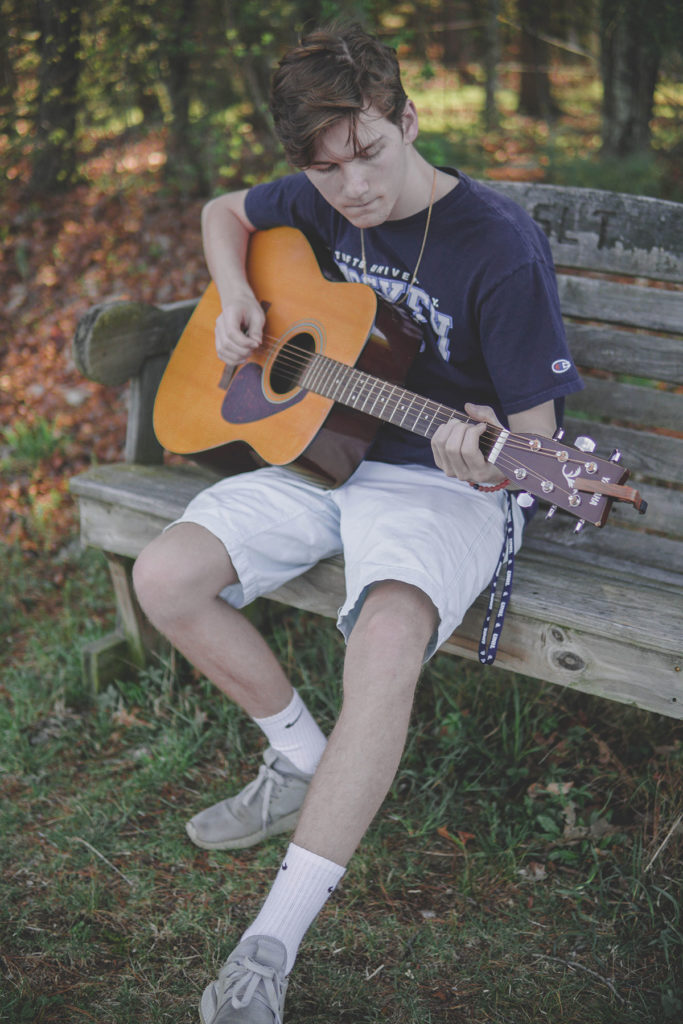JP BLOG
Share this
There’s a big lie that guitar players tell themselves.
Have you ever gone to play something on guitar that you could play a few days ago but it sounds like complete crap now? … like you can’t even play guitar.
It’s depressing. And nothing will de-motivate you more than feeling like you aren’t making progress. Newbies love noodling on their guitar without focus for hours… until they realize they’re going nowhere. Then they tend to give up.
 Good guitar players know that not all time spent playing guitar is equal.
Good guitar players know that not all time spent playing guitar is equal.
2 hours of random noodling on Saturday is NOT the same as 20 minutes a day of focused practice. I’ll confess… I used to be a weekend noodler too. I think most self-taught players are… and it’s because no one ever told us the truth …
Here’s What Not To do…
Some guitar players think that learning as much as you can about HOW to do things is how you get good. Of course, the more techniques, licks, and songs you know… the more well-rounded you’ll be. But as a beginner or intermediate player, you don’t have that luxury. You’ll end up taking a very long time to be the jack of all trades, master of none. Guthrie Govan says “Whatever you’ve learned becomes truly useful to you only once it has become second nature.” It’s that second nature part that most people never get to because they move on to the next thing too soon. Like I mentioned earlier, I struggled for years with practice and wondering why I couldn’t progress past a certain point. Then in 2008 I took a job at JamPlay and my eyes were forced open.
What working for a guitar education publishing company has taught me…
The late night noodle fests, long weekend sessions were not what these guys did to get to a world-class level. It had been there all along and I just couldn’t see it because of how stubborn I was. There were fundamental things they did that I did not do. And once I started doing what they did, that’s when the magic started happening. I learned that getting a goal and purpose forces you to focus on solving problems systematically. And that solving problems in your playing is the only way to progress fast. For example, in the past I would play a solo I learned all the way through and gloss over the fast ascending run at the end. I could play 80% of the solo note-for-note but the problem was the fast bit.
 Now, I understand that I don’t need to practice 80% of a song or solo, just the trouble spots. So instead of practicing the entire solo over and over for 20 minutes, I now just practice the trouble spot for that 20 minutes. Can you see how that forces you to improve? It’s not something that only elite guitar players understand. There’s an old principle I recently learned about. It’s known by a few different names … the “80/20 rule” or the lesser known “Pareto Principle” (learn about it on Wikipedia).
Now, I understand that I don’t need to practice 80% of a song or solo, just the trouble spots. So instead of practicing the entire solo over and over for 20 minutes, I now just practice the trouble spot for that 20 minutes. Can you see how that forces you to improve? It’s not something that only elite guitar players understand. There’s an old principle I recently learned about. It’s known by a few different names … the “80/20 rule” or the lesser known “Pareto Principle” (learn about it on Wikipedia).
Basically it states that 80% of the benefits comes from 20% of the effort. It applies to most things in life including guitar playing. “Practice your worst skill until it’s your strongest … and your playing will improve drastically” -Steve Eulberg
It’s important that you always remember that your practice sessions aren’t supposed to be jammed full of every technique and concept under the sun. They should be systematically upgrading specific skills to accomplish your goals. Focused DAILY PRACTICE, not weekend marathons is the best way to get good at guitar.
DON’T BE JUST A WEEKEND NOODLER.
Action Steps:
- Avoid procrastination by getting a solid goal with your guitar playing.
- Once have learned something, master it by using focused practice.
- Focus your practice by working on problem areas and weaknesses that are holding you back.
- Avoid noodling and limit practicing things that you’ve already mastered.
- Hold yourself accountable by tracking your progress. (Download our free practice template here.)
- Don’t just learn songs and move on. Use the 80/20 principle and hone in on the trouble spots.
If you do these things you will see a big difference in your playing in a short amount of time. And that progress will keep you motivated to continue practicing… which is how you get really REALLY good at guitar.


The 80/20 rule is a fundamental principle of choir and chorus practice. After practicing a song from beginning to end the conductor will say “Spots?”. And someone will pick a small section of the song to practice again and again. And frequently it’s just the Sopranos or Altos or both, or Tenors and/or basses, etc.
Also, Sal Kahn from Kahn Academy (free online learning) says when learning is the hardest and most difficult is when you’re learning the most and making the most progress. And conversely, when it’s easy you’re not learning much. Just knowing that helps to stay motivated.
The book Psycho-Cybernetics (original version) by Max Maltz details why it’s very important to never think negatively. Never think things like “This is too difficult”, “I’ll never learn this”, “I can’t do this”, etc. because that will become a self fulfilling prophecy. Instead think and say out loud positive things like “That was a very productive practice session”, “I’m going to take my time and learn this”, “I’m going to practice every day”, etc.
Pretty soon it will take root in your sub conscious and consistent progress will continue. The book details why this is true and is a very interesting read. Whatever you think, your sub conscious will believe whether it’s true or not and results WILL be consistent with your thinking. This works for every kind of learning.
The power of positive self-talk. Great ideas Paul.